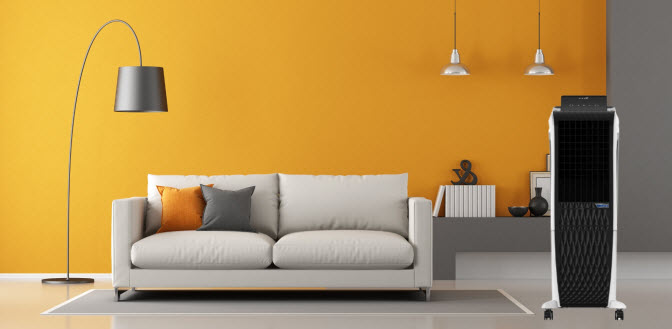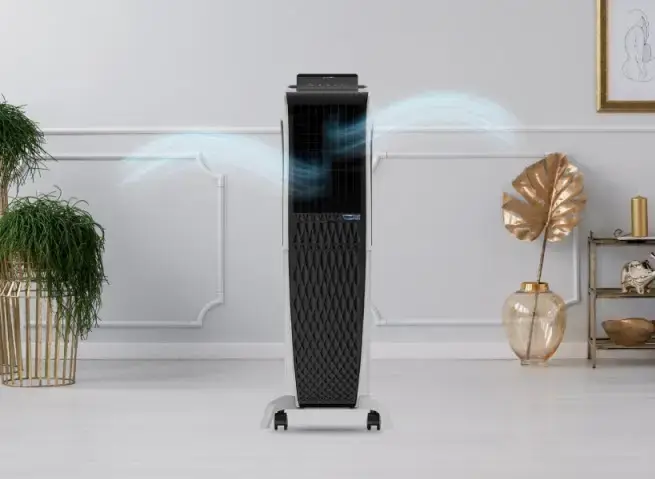As the world faces the impact of climate change, reducing carbon footprint and energy consumption has become crucial. During the summer season, air conditioners are commonly utilized to combat the ascending temperature. Nevertheless, the excessive utilization of air conditioners contributes to the carbon footprint and elevated electricity bills. Room coolers, otherwise referred to as evaporative coolers, are an excellent alternative to air conditioners that can assist in decreasing the carbon footprint and electricity expenses.
What are Room Coolers?
Room coolers, which are also referred to as evaporative or swamp coolers, decrease the temperature of the atmosphere by means of water evaporation. They work by drawing warm air into the cooler and passing it through wet pads or filters, which then evaporates the water and cools the air. The cooled air is then circulated into the room through a fan.

Environmentally Friendly
Room coolers are an eco-friendly option that helps reduce carbon footprint. Air conditioners use harmful refrigerants that contribute to greenhouse gas emissions, whereas room coolers use only water and electricity to operate. The utilization of room coolers as opposed to air conditioning units stands to reduce the quantity of detrimental gases that are emitted into the atmosphere to a significant degree.
Room Coolers are Cost-Effective
The implementation of room coolers, when compared to air conditioning units, proves to be more cost-effective in nature. Air conditioners possess a higher initial cost, consume a greater amount of energy, and require more frequent maintenance, which ultimately translates into higher long-term expenses. Conversely, room coolers possess a lower initial cost and necessitate minimal upkeep, thus positioning them as a fiscally responsible and cost-effective substitute for air conditioning units.
Room Coolers have a Low Carbon Footprint
Room coolers have a low carbon footprint as they use only water and electricity to operate. Air conditioners use refrigerants that have a high global warming potential and contribute significantly to greenhouse gas emissions. We can reduce our carbon footprint and contribute to a more sustainable future by using room coolers.

Room Coolers can Control Humidity
Room coolers have the capability to govern the moisture levels, thereby rendering a more congenial atmosphere, and potentially reducing the requirement for air conditioning. The process of natural evaporation is employed by room coolers to infuse moisture into the air, which ultimately culminates in an environment that is more pleasant and enjoyable.
Room coolers provide a remarkable substitute for air conditioning units and can substantially aid in mitigating carbon emissions while also reducing electricity expenses. Furthermore, they have the capacity to regulate humidity levels, resulting in more comfortable air and reducing the necessity for conventional air conditioning systems.
FAQs – Air Coolers
The Benefits of Room Coolers
Q1. What are room coolers?
A. Room coolers are devices that lower the temperature of a room by evaporating water. They draw warm air, pass it through wet pads or filters, evaporate the water, and then circulate the cooled air into the room using a fan. They are smaller than desert coolers.
Q2. How do room coolers help the environment?
A. Room coolers are environmentally friendly because they only use water and electricity to operate, avoiding harmful refrigerants found in air conditioners. This choice reduces carbon footprint and greenhouse gas emissions, contributing to a healthier planet.
Q3. What makes room coolers cost-effective?
A. Compared to air conditioning units, room coolers are more cost-effective. Air conditioners have higher initial costs, consume more energy, and require frequent maintenance, leading to greater long-term expenses. In contrast, room coolers have lower initial costs and minimal maintenance needs, making them a financially responsible alternative.
Q4. How do room coolers contribute to reducing carbon footprint?
A. Room coolers use water and electricity, avoiding the use of refrigerants with high global warming potential. Air conditioners contribute to greenhouse gas emissions due to their refrigerants. By using room coolers, you can help reduce your carbon footprint and support a sustainable future.
Q5. Can room coolers control humidity levels?
A. Yes, room coolers can regulate humidity levels. They utilize natural evaporation to introduce moisture into the air, creating a more comfortable and pleasant indoor environment. This may reduce the need for conventional air conditioning, which often dries the air.
Q6. Are room coolers a substitute for air conditioning units?
A. Certainly, room coolers function as an excellent alternative to air conditioning units. They provide efficient cooling, aid in lowering carbon emissions, reduce electricity costs, and offer humidity control. They can establish a comfortable indoor environment without the environmental and financial disadvantages of conventional air conditioners. However, it’s important to note that air coolers may not be a suitable substitute for AC during humid weather.
Q7. What sets room coolers apart from air conditioners?
A. Room coolers use water evaporation to cool the air, while air conditioners rely on refrigerants and complex mechanisms. Room coolers are eco-friendlier, cost-effective, and have a lower carbon footprint compared to air conditioning units.
Q8. Can room coolers be used in any room?
A. Indeed, room coolers can be utilized in a variety of indoor spaces, including bedrooms, living rooms, offices, and more. They are available in various sizes and capacities to accommodate different room dimensions and cooling requirements. While they can be employed in any location, it’s important to note that they rely on natural airflow for optimal performance; thus, using them in enclosed rooms is not recommended.
Q9. How do room coolers create a more pleasant environment?
A. By infusing moisture into the air through natural evaporation, room coolers can control humidity levels. This results in an environment that feels more comfortable and enjoyable, reducing the need for traditional air conditioning.
Q10. Why are room coolers considered sustainable?
A. Room coolers are considered sustainable because of their low carbon footprint, reduced energy consumption, and use of natural evaporation processes. By opting for room coolers over traditional air conditioners, you contribute to a greener and more environmentally conscious lifestyle.
